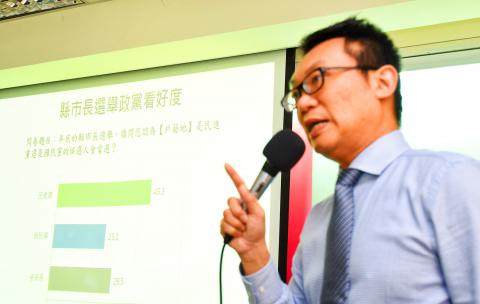More than 40 percent of the public believes that the Democratic Progressive Party’s (DPP) candidates will win in November’s mayoral and county commissioner elections, a poll published yesterday by the Taiwan NextGen Foundation showed.
According to the survey, 45.3 percent believe that the DPP’s candidates will win in the Nov. 24 nine-in-one elections, while 49.1 percent think that the party will win the majority of seats across the nation.
The poll showed that overall, 65.1 percent of respondents are satisfied with the administrative performance of the mayor or commissioner in their city or county of residence, while 24.8 percent are dissatisfied.

Photo: Liu Hsin-de, Taipei Times
The highest average satisfaction rate of 67.1 percent was in cities or counties that have a DPP member as an administrative head, followed by 63 percent in areas with a Chinese Nationalist Party (KMT) head and 60.4 percent in areas with an independent head.
Asked about their voting preference, about 35.9 percent said they would consider voting for the DPP’s candidate, while 27.6 percent said they would consider the KMT’s candidate first.
However, 25.2 percent said they believe the KMT’s candidate will win.
A cross-analysis of the data showed that more than 41 percent intended to support the party that the mayor or commissioner of their city or county of residence is a member of.
In areas with independent administrative heads — Taipei and Hualien and Kinmen counties, the party support rates showed a fairly even distribution among the DPP (24.6 percent), the KMT (25.7 percent) and independents (24.5 percent).
The survey found that 33.6 percent would prefer voting for the DPP’s candidate, 28.5 percent for the KMT’s candidate and 4.9 percent would prefer independent candidates.
Former DPP spokeswoman Wu Pei-yi (吳沛憶), who is to run in the party’s primary for a city councilor seat in Taipei’s Zhongzheng (中正) and Wanhua (萬華) districts, said it seems that most people will vote for DPP or KMT candidates.
However, about 8.4 percent of respondents said they would support third-party or independent candidates in the councilor elections and this combined force might have a big influence on the councilors’ votes, she said, adding that many of the candidates are aged between 25 and 35 and have entered politics through the Sunflower movement.
Foundation chairman Wang Zhin-sheng (王智盛) said that nearly 30 percent of pan-green camp supporters were unwilling to name their preferred party in the election, which might indicate that they are waiting to see the DPP’s nominee for the Taipei mayoral election.

ENDEAVOR MANTA: The ship is programmed to automatically return to its designated home port and would self-destruct if seized by another party The Endeavor Manta, Taiwan’s first military-specification uncrewed surface vehicle (USV) tailor-made to operate in the Taiwan Strait in a bid to bolster the nation’s asymmetric combat capabilities made its first appearance at Kaohsiung’s Singda Harbor yesterday. Taking inspiration from Ukraine’s navy, which is using USVs to force Russia’s Black Sea fleet to take shelter within its own ports, CSBC Taiwan (台灣國際造船) established a research and development unit on USVs last year, CSBC chairman Huang Cheng-hung (黃正弘) said. With the exception of the satellite guidance system and the outboard motors — which were purchased from foreign companies that were not affiliated with Chinese-funded

PERMIT REVOKED: The influencer at a news conference said the National Immigration Agency was infringing on human rights and persecuting Chinese spouses Chinese influencer “Yaya in Taiwan” (亞亞在台灣) yesterday evening voluntarily left Taiwan, despite saying yesterday morning that she had “no intention” of leaving after her residence permit was revoked over her comments on Taiwan being “unified” with China by military force. The Ministry of the Interior yesterday had said that it could forcibly deport the influencer at midnight, but was considering taking a more flexible approach and beginning procedures this morning. The influencer, whose given name is Liu Zhenya (劉振亞), departed on a 8:45pm flight from Taipei International Airport (Songshan airport) to Fuzhou, China. Liu held a news conference at the airport at 7pm,

AIR SUPPORT: The Ministry of National Defense thanked the US for the delivery, adding that it was an indicator of the White House’s commitment to the Taiwan Relations Act Deputy Minister of National Defense Po Horng-huei (柏鴻輝) and Representative to the US Alexander Yui on Friday attended a delivery ceremony for the first of Taiwan’s long-awaited 66 F-16C/D Block 70 jets at a Lockheed Martin Corp factory in Greenville, South Carolina. “We are so proud to be the global home of the F-16 and to support Taiwan’s air defense capabilities,” US Representative William Timmons wrote on X, alongside a photograph of Taiwanese and US officials at the event. The F-16C/D Block 70 jets Taiwan ordered have the same capabilities as aircraft that had been upgraded to F-16Vs. The batch of Lockheed Martin

GRIDLOCK: The National Fire Agency’s Special Search and Rescue team is on standby to travel to the countries to help out with the rescue effort A powerful earthquake rocked Myanmar and neighboring Thailand yesterday, killing at least three people in Bangkok and burying dozens when a high-rise building under construction collapsed. Footage shared on social media from Myanmar’s second-largest city showed widespread destruction, raising fears that many were trapped under the rubble or killed. The magnitude 7.7 earthquake, with an epicenter near Mandalay in Myanmar, struck at midday and was followed by a strong magnitude 6.4 aftershock. The extent of death, injury and destruction — especially in Myanmar, which is embroiled in a civil war and where information is tightly controlled at the best of times —